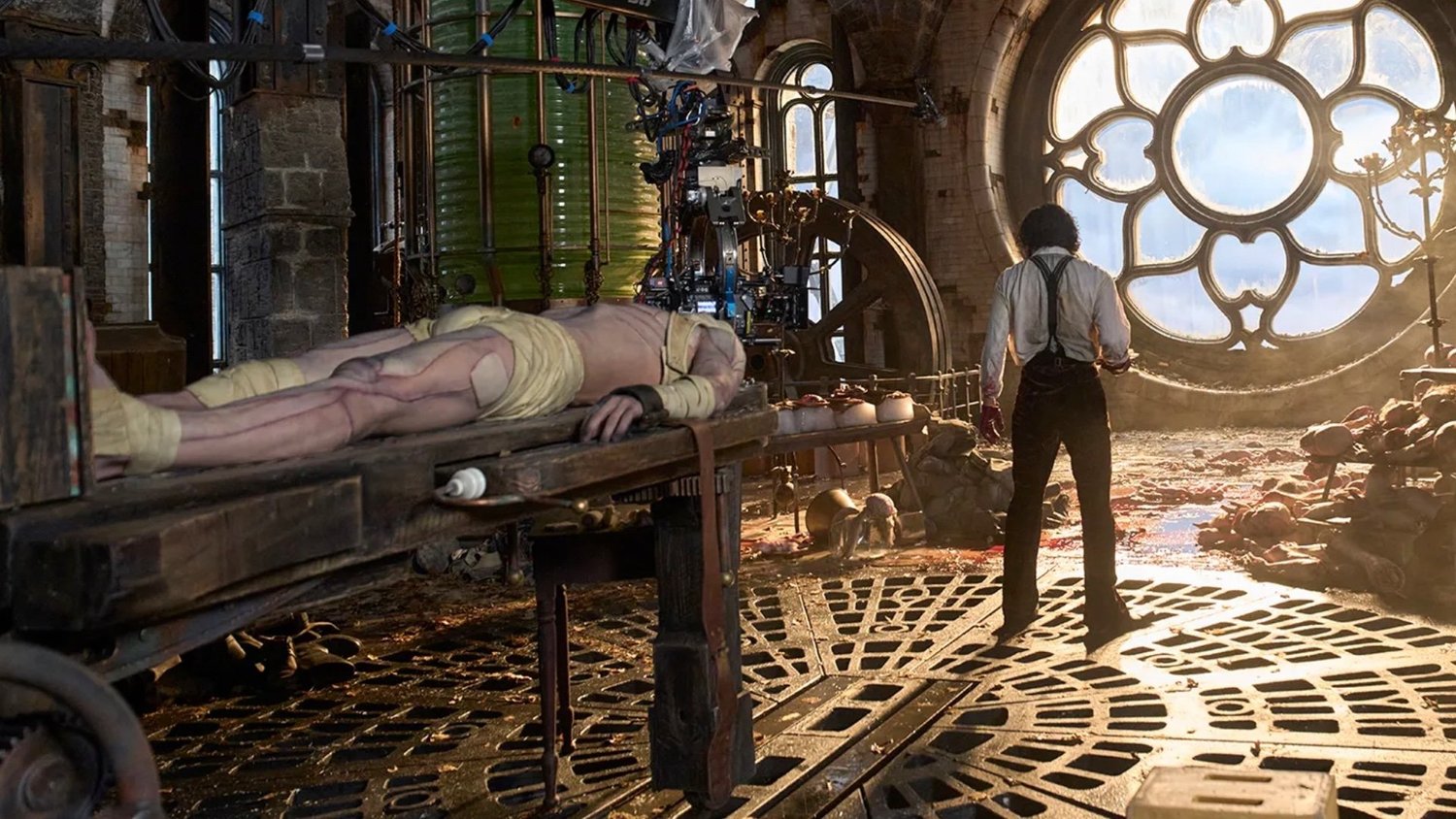First Man Is Damien Chazelle’s Quieter Career Left-Turn
Jan 5, 2023
In the last decade, Damien Chazelle has developed into one of the premiere filmmakers of his generation producing large-scale epics like his newest film Babylon, but also venturing into quieter territory with his film First Man. Chazelle started out with the indie sensation of Whiplash: a psychological drama about a student jazz drummer. He then reached to the highest levels of success with La La Land by winning Best Director at the Academy Awards for his homage to Hollywood musicals. For as proficient as he is at crafting stories about individuals in the performing arts who strive for greatness by any means necessary, Chazelle is not exactly a graceful filmmaker.
With Damien Chazelle’s work, the audience can feel the proverbial blood, sweat, and tears that the young director goes through in order to execute his themes and inject the viewer with a visceral rush of energy. This lack of effortless directing is hard to escape from considering that his main characters on screen are all about people who climb uphill battles and push themselves to the absolute limit to become the next great jazz musician. Based on its trailers and marketing, the same kind of chaotic energy appears to be as present as ever in his newest film about Golden Age Hollywood, Babylon. On the other end of the spectrum, though, Chazelle’s film First Man doesn’t check the boxes of the usual traits of Chazelle’s style. In fact, if there was ever a time when the Oscar-winning director was subtle with his ideas and reserved with his tone, it was this peculiar, off-kilter biopic about Neil Armstrong (Ryan Gosling) and the Apollo 11 space mission to the moon.
Ryan Gosling’s Performance In ‘First Man’ Is Jarring
Image via Universal Pictures
If the protagonists of Damien Chazelle’s previous films are transparent about their motivations, then Neil Armstrong’s are the total opposite. Gosling gives a chillingly reticent performance of the astronaut who took the first steps on the moon in July 1969. His coldness and standoffishness is quite jarring on first watch, throwing off what might be expected from a portrayal of an American icon. This depiction of Armstrong makes him so unassuming about what he is thinking and the basis of his motives. Rather than Chazelle’s usual method of broader characterization, the audience is slowly lured into the mindset of Armstrong. The one through-line of First Man in relation to Chazelle’s filmography is the expedition towards greatness.
Armstrong does indeed push the limits of the United States’ primitive space technology in order to reach the moon, but where this film differs is the unearthed layers beneath the surface beyond just the personal satisfaction of success. Neil Armstrong holds a trauma inside of him, the death of his two-year-old daughter from a brain tumor, that may explain his endeavors in space, but what will be accomplished for his own well-being? A conclusion can be formed that, in this text, Armstrong, after witnessing the failure of technology in saving his child’s life, he must test the limits of technology, and experiencing only a fractional amount of catharsis as a result.
RELATED: First Man Review: The Danger Is in the Details
Reconsidering ‘First Man’ With Historical Context
Image via Universal Pictures
Looking for proper importance of the space mission is a lingering theme of First Man. By no means a piece of nationalistic propaganda, the film carefully questions the inherent value of this dangerous space expedition that was worth a massive financial undertaking and cost numerous lives. In Whiplash and La La Land, there is perhaps a sense of pretentiousness surrounding the characters of their respective films and their self-indulgence about the performing arts craft. Chazelle’s own standpoint can be disputed, but it is clear that his characters carry a self-importance about their passion. The moon landing of Apollo 11 is one of the most iconic moments in recent American history, but there is nothing celebratory about what Armstrong and his team at NASA are venturing out to do in First Man.
Neil’s wife, Janet Armstrong (Claire Foy), shatters the expectations of the “supportive wife” archetype. Instead, she is baffled by her husband’s stalwart determination to risk his life for something that NASA is not scientifically prepared to partake in. She is left with no enthusiasm regarding his expedition to the moon, but rather with a deep sense of frustration due to his emotional distance from their children. The film smartly does not make her the villain, or the detour that prevents the brilliant astronaut from accomplishing his goal. Because of the film’s deep contemplation of the validity of the mission from a historical context, Janet serves as an audience avatar.
One of the final scenes in the film shows the astronauts in quarantine after returning from the fateful voyage to the moon after all, and a speech from John F. Kennedy plays on the television. The speech, colloquially known as “We Choose to go to the Moon” from 1962, meshes itself into the film’s text perfectly. It signals that this mission was not sought after due to sheer human aspiration. Neil Armstrong and his fellow space travelers were merely cogs in the machine for the demands of the U.S government.
‘First Man’s Depiction of Space Travel Is Not Glamorous
Image via Universal Pictures
The space travel set pieces of First Man are quite harrowing. While the drumming sequences of Whiplash are immensely stressful, they bear the same exhilarating rush of excitement of a roller coaster. Watching Armstrong fly through space is pure dread. These sequences demonstrate the film’s thesis that the U.S was never prepared to land on the moon. The spartan and bare-bones design of the spacecrafts is felt through Chazelle’s suffocating close-ups and jittery camera movements. The audience develops a strong understanding as to how so many NASA pilots were killed during the process of leading up to Apollo 11.
There is also an all encompassing sense of decay present in the film, which is certainly a far-cry from the lively energy of Chazelle’s previous film, La La Land. Armstrong’s emotional vacancy breaks the stereotypical portrait of the idealistic family structure of mid-20th century America. This was Chazelle’s first instance of telling a story about laborers and mathematicians and not artists, and the director exemplifies this change with his own stylistic evolution. The NASA crew cannot be embraced, and the unglamorous depiction of their line of duty might be off-putting for viewers. The scene in which Armstrong must explain to his kids that he may not ever return from the Apollo 11 mission is hypnotic in many ways, not featuring the usual melodramatic beats of an emotionally gripping scene like this. It is as close to watching someone’s soul, in this case, Armstrong, slowly fade away to oblivion, as he is incapable of offering his kids any assurance that he will survive.
With a film this bleak, and an ending that features limited personal and American triumph, and instead replaced with remaining feelings of vacancy over the lack of a purpose behind the mission, it is not a surprise that First Man was a box office disappointment. Unlike Whiplash and La La Land, this film was shut out of major Academy Awards recognition. Because of the film’s evolved tone and narrative ambition from the rest of Chazelle’s filmography, it appeared to be destined as a launching pad for the director to take a new angle in his career. While there are plenty of deep readings of the text, Chazelle plays his hand with no force that it makes the film more curious to analyze, thus making it feel effortless in its directing. However, early signs show that his 2022 film, Babylon, is a return to his grandiose and theatrical form, perhaps as a correction for the muted response to his quiet and unassuming left-turn of a film, First Man.
Publisher: Source link
TV Shows That Got Canceled In 2024
TV Shows That Got Canceled In 2024 Which 2024 canceled TV show will you miss the most? Share your pick in the comments! Disclaimer: This story is auto-aggregated by a computer program and has not been created or edited by…
Dec 22, 2024
How The Talk Emotionally Ended After 15 Years
The Talk has officially said "Goodbye." After 15 seasons and 2,993 episodes, the CBS daytime show came to an end on Dec. 20 with a heartfelt farewell from hosts Akbar Gbajabiamila, Amanda Kloots, Natalie Morales, Jerry O'Connell and Sheryl Underwood. The episode began with a standing ovation for the…
Dec 22, 2024
Jennifer Lopez Asked About Turning 60, Age
Jennifer Lopez Asked About Turning 60, Age Never ask a woman her age, a man his salary, or Jennifer Lopez how she feels about turning 60. On Sunday, the actor was interviewed by Variety amid the release of her new…
Dec 21, 2024
Lala Kent Shares Text With Ally Lewber After James Kennedy’s Arrest
The BCU (Bravo Cinematic Universe) was shaken on March 3, 2023, when it was confirmed that Tom and Ariana had ended their nine-year relationship amid the revelation that he'd had a seven-month affair with Raquel. "I made mistakes, I was…
Dec 21, 2024











